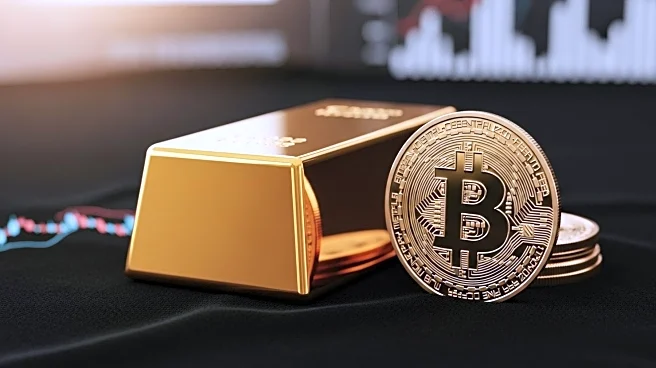What's Happening?
Gold has reached a record high of $3,600 per ounce, driven by expectations of a Federal Reserve rate cut following a weak U.S. jobs report. The report indicated a slowdown in hiring and a rise in unemployment, the highest since 2021, leading traders to anticipate a rate cut at the Fed's upcoming meeting. Bitcoin critic Peter Schiff has used this milestone to argue that investors have favored Bitcoin over gold incorrectly. Schiff points out that Bitcoin is currently 15% lower compared to gold than its 2021 peak. Despite this, Bitcoin proponents argue that while gold may dominate in the short term, Bitcoin will ultimately prevail in the long term, with some predicting Bitcoin could reach $1 million before gold hits $5,000.
Why It's Important?
The debate between gold and Bitcoin highlights the ongoing discussion about the relative strengths of traditional and digital assets. Gold's surge reflects investor concerns about economic stability and the potential for further monetary easing by the Federal Reserve. This situation underscores the importance of safe-haven assets in times of economic uncertainty. Bitcoin's proponents argue for its long-term potential, suggesting it could outperform gold as a store of value. The outcome of this debate could influence investment strategies and asset allocation decisions among institutional and retail investors, impacting the broader financial markets.
What's Next?
The Federal Reserve's decision on interest rates will be closely watched, as it could further influence gold and Bitcoin prices. Additionally, Tether's interest in gold and its potential investments in the gold supply chain may lead to increased integration between digital and physical assets. Companies exploring gold-backed tokens could enhance the utility of physical gold in digital ecosystems, potentially reshaping the landscape of commodity-backed cryptocurrencies. Market analysts will continue to monitor these developments, assessing their impact on both traditional and digital asset markets.
Beyond the Headlines
The growing interest in gold by digital currency firms like Tether reflects a broader trend of convergence between traditional commodities and digital assets. This trend raises questions about the long-term viability and strategic coherence of such initiatives, as industry insiders remain skeptical. The interplay between digital and physical assets could lead to innovative financial products, but also poses challenges in terms of regulatory compliance and market acceptance.











